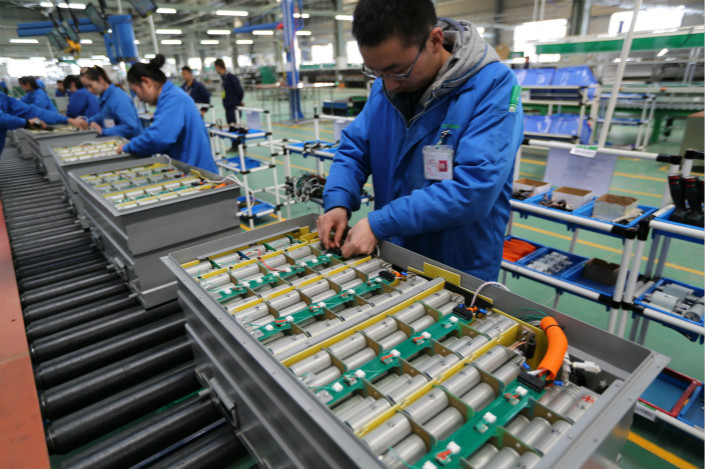Carmakers Charged With Electric-Vehicle Battery Disposal

China is placing responsibility for properly recycling vehicle batteries on new-energy carmakers — an effort to prevent environmental pollution in the emerging sector.
The new guidelines, which will take effect in August, also include rules for related industry players such as battery producers.
The guidelines — which were jointly issued Monday by the Ministry of Industry and Information Technology and six other agencies — said new-energy car producers and their sales units must set up “recycling service networks,” where spent batteries will either be repaired for reuse or properly disposed of.
The policy will employ a “traceable system” in which battery producers give each battery a code, which carmakers log when a vehicle is sold, as part of routine customer information.
Carmakers should also provide incentives to encourage customers to participate in the recycling process, such as repurchase or trade-in discounts and subsidies, the guidelines said.
Battery producers, meanwhile, should coordinate on battery design, to facilitate easy and efficient recycling, including sharing with carmakers expertise about proper disposal and preservation of batteries, the guidelines added.
China has been promoting new-energy vehicles since 2009, mainly through subsidies at both central and local government levels.
Those efforts have helped make China the world’s largest market for such vehicles, with 1.8 million units having been sold by the end of last year. But this rapid development has meant that a large amount of potential waste has been produced, as batteries used for electric cars in earlier years are set to be retired.
The batteries often contain toxic heavy metals such as nickel and cobalt, which can pollute the environment and pose danger to public health, according to Liu Renqiang, a senior technician at the China Automotive Technology and Research Center Co. Ltd., a government research group.
Contact reporter Mo Yelin (yelinmo@caixin.com)

- 1Cover Story: China Carves Out a Narrow Path for Offshore Asset Tokenization
- 2Drownings Shake Chinese Enthusiasm for Travel to Russia
- 3China Business Uncovered Podcast: A $15 Billion Bitcoin Seizure and the Fall of a Cybercrime Kingpin
- 4Over Half of China’s Provinces Cut Revenue Targets
- 5Li Ka-Shing’s Port Empire Hit by Forced Takeover Amid Panama Legal Dispute
- 1Power To The People: Pintec Serves A Booming Consumer Class
- 2Largest hotel group in Europe accepts UnionPay
- 3UnionPay mobile QuickPass debuts in Hong Kong
- 4UnionPay International launches premium catering privilege U Dining Collection
- 5UnionPay International’s U Plan has covered over 1600 stores overseas






